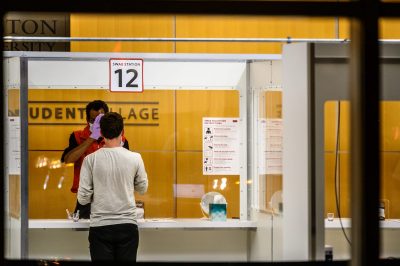
Boston University has been given approval to start sequencing all positive COVID-19 tests to scan for the newly identified variants of the disease, according to a member of BU’s Medical Advisory Group.
Davidson Hamer, global health professor in the School of Public Health, said the lab will look for the United Kingdom, Brazil, South Africa and California variants in these tests to determine their prevalence in the community.
“The thing is that in order to identify the new variants, you need to do sequencing,” Hamer said. “You actually have to sequence the virus and then identify the subtle changes in the spike protein.”
Sequencing is a process that involves doing a genetic analysis of a virus sample to identify any mutations and variations to the virus itself.
BU’s current testing process can identify all positive cases, even if they are of the new variants, Hamer said, because they have not mutated significantly from the original virus.
“We’ll continue to be able to diagnose new cases, or new infections,” Hamer said. “Students, faculty and staff with the currently available tests, they won’t miss any cases.”
The sequencing process will occur after the positive result and will use the “leftover sample” of an individual’s swab test, Hamer said. BU will sequence all positive cases for the remainder of the Spring semester and the sequencing itself will take place in a separate lab.
“Sequencing is relatively fast now,” he said. “It won’t slow the effective process at all.”
Hamer said more data collection needs to occur before determining whether these new variants are within the BU community.
“It would be important to know if they’re emerging and spreading and becoming dominant strains here,” Hamer said, “because if they are, then we may need to further intensify our control measures.”
Currently, he added, BU has no plans to increase COVID-19 protocols on campus in response to the spread of the new variants.
“All those measures that we’ve been truly using, if applied appropriately, should be sufficient to prevent this,” Hamer said, “and that there’s not really a need to have an extra layer of mask for example.”
BU spokesperson Colin Riley wrote in an email adherence to BU health measures will be important in preventing the spread of the variants.
“Concerns of increased transmissibility underscore and reinforce the critical need to adhere to regular and proper mask use, physical distancing, and hand washing hygiene,” Riley wrote. “These public health measures work well and we need to continue to adhere to them.”
Alexa Garguilo, a freshman in the College of Communication, said she was also confident in the safety measures at BU.
“I currently feel safe enough,” Garguilo said. “I know that they’re doing everything that they can to keep it safe and that even though there is a new strand, still we’re treating it as contagious as the first.”
Garguilo said BU’s frequent testing process gives her peace of mind, but noted that students need to be smart about their gatherings.
“I feel a lot safer being tested consistently,” she said, “but just making sure there’s no parties or big gatherings so we don’t have an outbreak and have to get sent home.”
College of General Studies sophomore Talya Havivi said she is taking extra precautionary measures due to the threat of variants as well as the inherent risks of living on a college campus.
“I’m more concerned about being in a campus environment and in a city with all these variants,” Havivi said, “and taking personal safety measures to safeguard against them.”
Havivi said she is “more conscious” and has increased her use of hand sanitizer.
However, she said she thinks BU should add more protocols on gatherings because the variants pose a greater risk for young people.
“I think there could be tighter rules about smaller gatherings,” Havivi said. “As a campus full of young people, we’re all at risk for the variants.”




























































































































